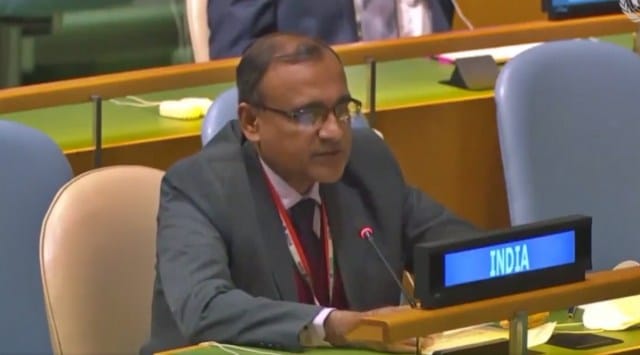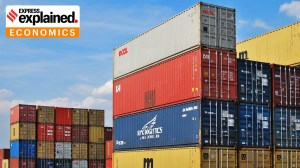- India
- International
Scale, severity of humanitarian needs in Syria should provoke collective conscience of UN Security Council: India
India's Permanent Representative to the UN Ambassador T S Tirumurti said that the politicisation of the humanitarian track must end. He added that humanitarian assistance to Syria must take into consideration the independence, territorial integrity and sovereignty of the country.
 India's Permanent Representative to the UN, T S Tirumurti.
India's Permanent Representative to the UN, T S Tirumurti.India has said the scale and severity of humanitarian needs in Syria should provoke the “collective conscience” of the UN Security Council, stressing that “politicisation” of the humanitarian track must end as it voiced concern over the war-torn country’s dire situation.
India’s Permanent Representative to the UN Ambassador T S Tirumurti told the Security Council open briefing on the humanitarian situation in Syria on Thursday that India firmly believes that all humanitarian aid delivery to Syria must be consistent with the United Nations guiding principles of humanitarian assistance.
“The scale, severity and complexity of humanitarian needs should provoke the collective conscience of this Council, particularly those who advocate linking of humanitarian assistance to their expected outcomes on the political track. It is difficult to comprehend such an approach,” Tirumurti said.
“Politicisation of the humanitarian track must end. It is not feasible for people in need of urgent and dire humanitarian assistance to wait endlessly till political objectives of all parties to the conflict are met fully,” he said.
In his remarks, Tirumurti addressed two inter-linked questions of humanitarian access and principles, which are closely inter-related in the context of Syria.

“Humanitarian assistance to Syria, be it cross-border or cross-line, must take into consideration the independence, territorial integrity and sovereignty of Syria,” he said.
Tirumurti said that concrete steps need to be taken to address hurdles that are obstructing the functioning of both cross-border and cross-line operations, in particular, the delays in granting requisite approvals to humanitarian aid convoys.
“All parties need to protect health and humanitarian workers.”
He further said the other inter-connected issue is that of comprehensive and objective assessment of unilateral measures imposed by countries on Syria.
“Such measures only aggravate the prevailing economic, humanitarian and development crisis, with devastating effects for the entire population, particularly the women, children and the elderly,” Tirumurti added.
India underscored the importance of active engagement of the UN with Syria towards the implementation of the UN Strategic Framework to achieve the outcomes that have been set out.
India continues to stand shoulder by shoulder with the people of Syria in this grave hour of need, Tirumurti said.
He added that earlier this month, responding to the request for emergency humanitarian assistance from the Syrian Government, India delivered more than 2000 metric tons of rice for Syrians through the port city of Latakia and shared more than 10 MT medicines last year to help them through the pandemic.
“We stand ready to work with the UN and its agencies to ensure that ‘Made in India’ vaccines, in keeping with the clarion call of our Prime Minister of ‘Vaccines for all’, can also be brought to the aid and assistance of the people of Syria,” Tirumurti said.
Under-Secretary-General for Humanitarian Affairs and Emergency Relief Coordinator Mark Lowcock, in the briefing to the Council, said Syria’s fragile economy has suffered multiple shocks over the past 18 months, the purchasing power has dwindled substantially as a result and millions of Syrians are resorting to desperate measures to survive.
“More than 70 per cent of Syrians say they have taken on new debt over the last year. Many are selling assets and livestock. Parents are eating less so they can feed their children, and they are sending them to work instead of to school. Those who have run out of options are simply going hungry,” he said.
Lowcock added that all humanitarian assistance that enters northwest Syria is delivered cross-border and supports 2.4 million people monthly. Without it, “the situation would go from terrible to catastrophic”.
Tirumurti voiced concern that Syria is facing a dire situation compounded by a multiplicity of factors like COVID, harsh winter conditions, food insecurity and putting into peril the future of its 17.6 million citizens, including nearly 6.2 million displaced people, the biggest internally displaced population anywhere in the world.
“Across the region, 10 million people, including 5.5 million Syrian refugees continue to remain dependent on humanitarian assistance. Children have been particularly badly affected,” he said.
He noted with concern that the dire humanitarian situation in Syria has been further worsened by deteriorating economic conditions as well as continuing food insecurity.
Tirumurti cited a January 2021 World Food Programme (WFP) report that said the price of Syria’s standard basic food items basket in December 2020 was 236 per cent higher compared to December 2019, a month-to-month increase of 13 per cent that brought the price to its highest record since WFP started monitoring prices in 2013.
Apr 18: Latest News
- 01
- 02
- 03
- 04
- 05





























